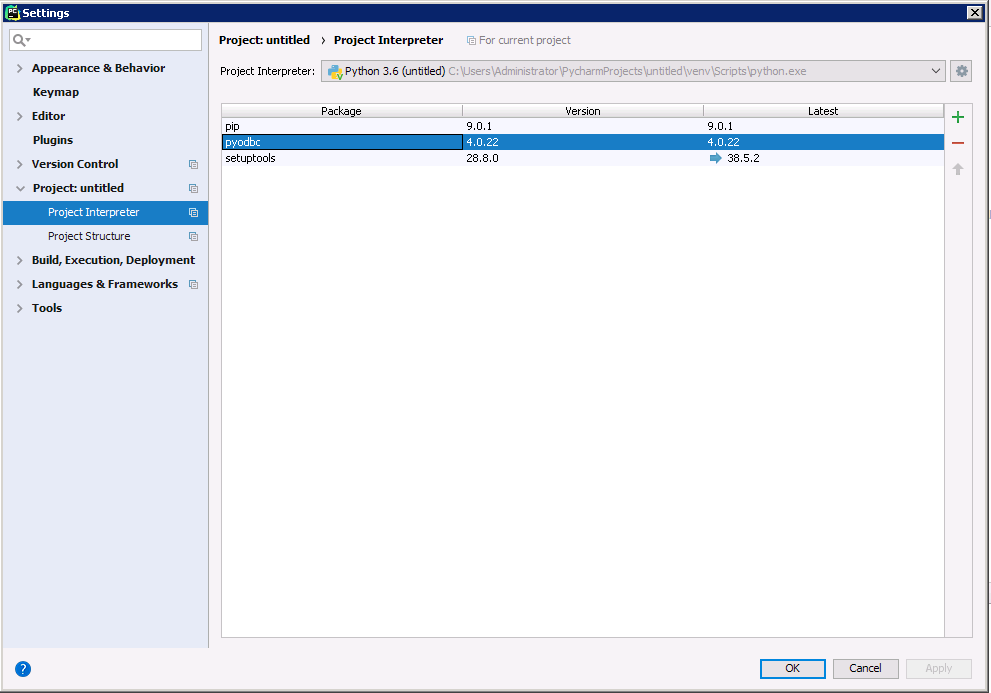Model Context Protocol (MCP) finally gives AI models a way to access the business data needed to make them really useful at work. CData MCP Servers have the depth and performance to make sure AI has access to all of the answers.
Try them now for free →Using the CData ODBC Driver for Odoo in PyCharm
Connect to Odoo as an ODBC data source in PyCharm using the CData ODBC Driver for Odoo.
The CData ODBC Drivers can be used in any environment that supports loading an ODBC Driver. In this tutorial we will explore using the CData ODBC Driver for Odoo from within PyCharm. Included are steps for adding the CData ODBC Driver as a data source, as well as basic PyCharm code to query the data source and display results.
To begin, this tutorial will assume that you have already installed the CData ODBC Driver for Odoo as well as PyCharm.
About Odoo Data Integration
Accessing and integrating live data from Odoo has never been easier with CData. Customers rely on CData connectivity to:
- Access live data from both Odoo API 8.0+ and Odoo.sh Cloud ERP.
-
Extend the native Odoo features with intelligent handling of many-to-one, one-to-many, and many-to-many data properties. CData's connectivity solutions also intelligently handle complex data properties within Odoo. In addition to columns with simple values like text and dates, there are also columns that contain multiple values on each row. The driver decodes these kinds of values differently, depending upon the type of column the value comes from:
- Many-to-one columns are references to a single row within another model. Within CData solutions, many-to-one columns are represented as integers, whose value is the ID to which they refer in the other model.
- Many-to-many columns are references to many rows within another model. Within CData solutions, many-to-many columns are represented as text containing a comma-separated list of integers. Each value in that list is the ID of a row that is being referenced.
- One-to-many columns are references to many rows within another model - they are similar to many-to-many columns (comma-separated lists of integers), except that each row in the referenced model must belong to only one in the main model.
- Use SQL stored procedures to call server-side RFCs within Odoo.
Users frequently integrate Odoo with analytics tools such as Power BI and Qlik Sense, and leverage our tools to replicate Odoo data to databases or data warehouses.
Getting Started
Add Pyodbc to the Project
Follow the steps below to add the pyodbc module to your project.
- Click File -> Settings to open the project settings window.
- Click Project Interpreter from the Project: YourProjectName menu.
- To add pyodbc, click the + button and enter pyodbc.
- Click Install Package to install pyodbc.

Connect to Odoo
You can now connect with an ODBC connection string or a DSN. See the Getting Started section in the CData driver documentation for a guide to creating a DSN on your OS.
To connect, set the Url to a valid Odoo site, User and Password to the connection details of the user you are connecting with, and Database to the Odoo database.
Below is the syntax for a DSN:
[CData Odoo Source]
Driver = CData ODBC Driver for Odoo
Description = My Description
User = MyUser
Password = MyPassword
URL = http://MyOdooSite/
Database = MyDatabase
Execute SQL to Odoo
Instantiate a Cursor and use the execute method of the Cursor class to execute any SQL statement.
import pyodbc
cnxn = pyodbc.connect('DRIVER={CData ODBC Driver for Odoo};User = MyUser;Password = MyPassword;URL = http://MyOdooSite/;Database = MyDatabase;')
cursor = cnxn.cursor()
cursor.execute("SELECT name, email FROM res_users WHERE id = '1'")
rows = cursor.fetchall()
for row in rows:
print(row.name, row.email)
After connecting to Odoo in PyCharm using the CData ODBC Driver, you will be able to build Python apps with access to Odoo data as if it were a standard database. If you have any questions, comments, or feedback regarding this tutorial, please contact us at support@cdata.com.

